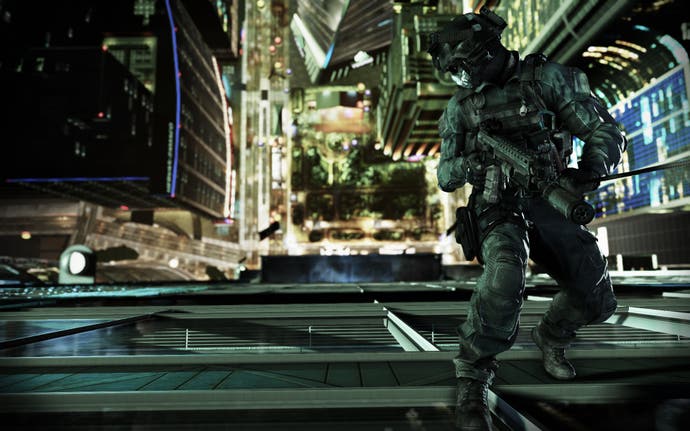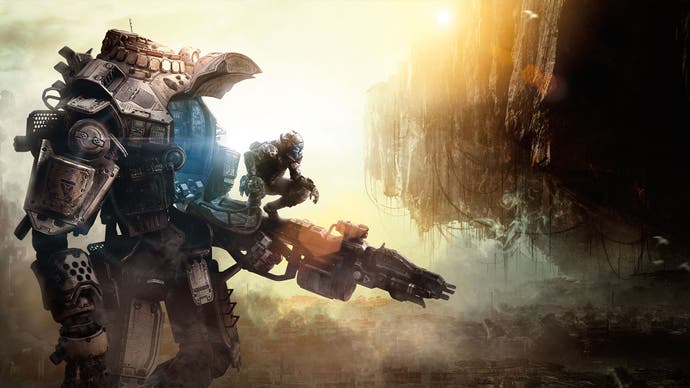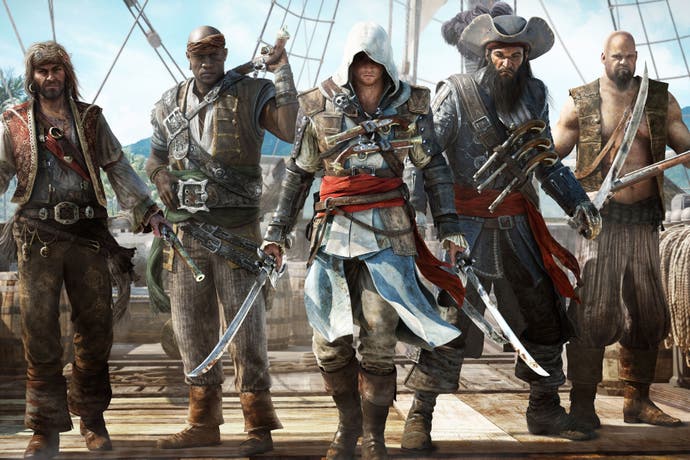The fall and rise of the franchise titans
With Assassin's Creed and COD sales slowing, their next-gen successors are waiting in the wings.
There's a moment, not too far into Call of Duty: Ghosts' lacklustre campaign, when you bear witness to the storming of a beach. The destroyed shores of Santa Monica are being invaded by The Federation, a messy construct of evil South Americans who, in Ghosts' near-future fiction, embody an irrational fear that lurks within the part of the US psyche that Infinity Ward's games now so often reflect. Whether deliberately or not, there's also a recursive nod being made back to Call of Duty's Xbox 360 debut, and to the D-Day landings that starred in Infinity Ward's second game.
Eight years on from Infinity Ward's rousing console debut, the fact that all Ghosts has to offer is bigger bangs and more irksome politics suggests that ideas are fast running dry for the series, and perhaps that its time as the dominant video game franchise could be coming to a close. Some of the rhetoric around its early sales figures suggests as much as well.
When Activision rushed to celebrate the success of Call of Duty: Ghosts, it was interesting to see which figures it chose to lead with. Whereas in the past the story has been told using the amount of money generated by day-one sales, this year it was about how much had been sold into retail rather than sold on to players. That $1 billion is an impressive but hollow statistic, although it shouldn't come as too much of a surprise. In the wake of Grand Theft Auto 5's hyper success, there's probably no point willy-waving when you can get away with talking about the size of your boxers instead.

The obfuscation's there for a reason, and it's a reason the PC version sheds a little more light on. Steam now has 65 million users, which gives us a pretty big snapshot where there's no generational gap to blur the picture, and activity on Valve's service around Call of Duty: Ghosts has dropped compared to last year, according to this recent report. Multiplayer activity around Black Ops 2 saw a peak of some 50,000 users during launch week, while with Ghosts that figure is more like 35,000. It's a decline that Activision will have to work hard to turn around with the Treyarch's inevitable return next November.
It's a decline that's not exclusive to Call of Duty, either. Sales of fellow annual mega-franchise Assassin's Creed have also slowed this year, with a fall of some 60 per cent compared to Assassin's Creed 3. There are some obvious reasons for the decline, of course - with a cross-generational release, there's a good chance that many regular Assassin's Creed fans are waiting for the arrival of the Xbox One and PlayStation 4 a little later in the month before they dive in. And well they should, as the tighter open-world adventure offered by Assassin's Creed 4 is probably one of the safest bets on day one. Still, it'd be surprising if those later adopters were enough to bridge that sizeable gap.
It seems that apathy is creeping in, which is probably to be expected from two series that have been released with metronomic regularity throughout the last generation. It's an apathy that is increased by the arrival of new consoles when there's a revitalised appetite for new worlds and new ideas. And it's apathy that other big franchises have fallen foul of in the past.
Transplanting an annual series onto a new generation is a tough task, and something that, beyond the immutable appeal of a sports brand like FIFA, hasn't really been pulled off before. Tony Hawk's was a famous casualty this generation, limply skating on to the first few rounds of the current generation before quietly being put to rest. There are other, closer analogues too - Prince of Persia and Medal of Honor, both mega franchises of the PS2 era, petered out in the age of the Xbox 360 and PS3.

Assassin's Creed and Call of Duty are in a stronger position than both Prince of Persia and Medal of Honor were, of course, but it's safe to say that their best days are behind them - and that it's only natural to see interest tail off, even if the budgets behind them keep rising. It'd be a shock to see them both still standing come the end of the next generation, but at least Ubisoft, EA and Activision have set a succession plan in place.
Ubisoft Montreal already proved it's good at shedding the skin of its worn-out successes when much of the breezy adventure of Prince of Persia found its way into Assassin's Creed, and now it has wrapped up that formula in a thick overcoat and a baseball cap in the hope of doing the same again with Watch Dogs. Activision, too, has Destiny waiting in the wings, with Bungie's sci-fi epic hopefully providing a much-needed alternative to the increasingly tired Call of Duty formula.
There's another, truer successor to Call of Duty, too. When EA spent big on securing the services of Jason West and Vince Zampella, it was surely hoping the pair could recreate the magic formula it had hit upon with one of the series that defined this generation, as well as one of the series that defined the last. There's a clear line that can be drawn from the noisy chaos of Medal of Honor through Call of Duty and on to Titanfall, which refines that choreographed disorder into a multiplayer shooter that's brilliantly tactical as well as joyously tactile.
As Call of Duty begins to look all washed up, here's hoping that Titanfall doesn't have to resort to another beach invasion to get across its vision of a next-gen first-person shooter.

